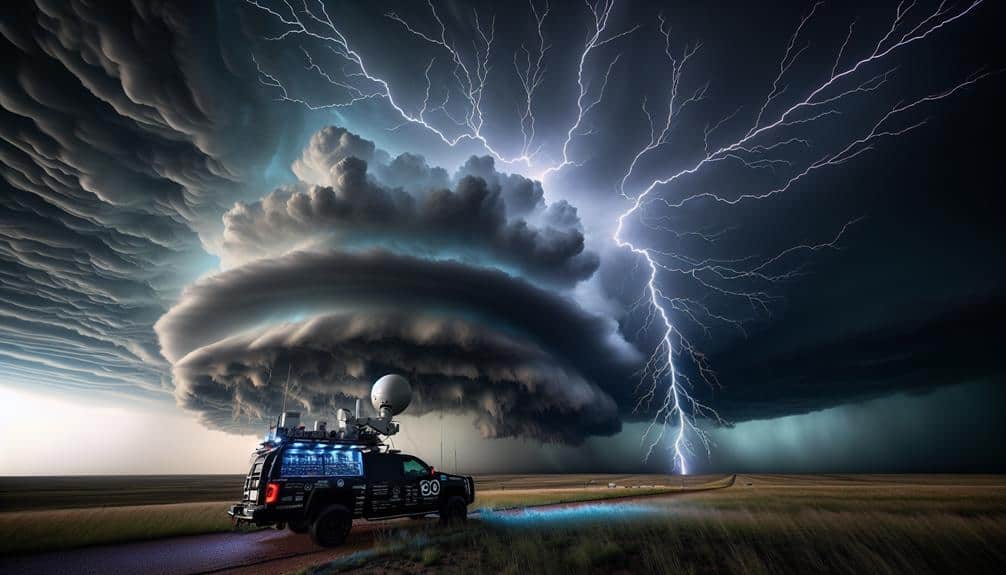Supporting our local communities after storms means coming together to provide immediate relief, assist in cleanup efforts, and support long-term recovery. First, let's gather necessary supplies like food and water and organize donation drives, ensuring those most in need get help quickly. Next, we can form volunteer teams to clear debris and repair infrastructure, showing our solidarity through physical labor. Finally, let's focus on rebuilding neighborhoods and offering financial aid, like grants and low-interest loans, while also giving much-needed emotional support. If we continue, we'll discover more ways to make a lasting, meaningful impact.
Key Points
- Organize donation drives to collect and distribute essential supplies like food, water, and shelter materials.
- Form volunteer teams to assist with debris clearing and infrastructure repair efforts.
- Provide financial aid through grants and low-interest loans to support rebuilding efforts.
- Collaborate with local organizations, businesses, and government agencies for coordinated recovery initiatives.
Provide Immediate Relief
In the aftermath of a storm, our immediate focus should be to make sure that everyone has access to necessary supplies like food, water, and shelter. We can make a significant impact by organizing donation drives and volunteer opportunities. These efforts guarantee that emergency supplies reach those who need them most. Community outreach is vital; by connecting with local organizations, we can identify the most pressing needs and streamline our response.
Let's come together to collect and distribute essential items. Setting up donation drives in convenient locations allows us to gather food, bottled water, blankets, and other necessary supplies quickly. We can also offer volunteer opportunities for those keen to help, ensuring that every willing hand is put to good use.
Furthermore, effective community outreach helps us communicate with affected families and individuals, providing them with information on where they can find shelter and receive aid. By working closely with local groups and authorities, we can create a coordinated effort that maximizes our impact.
Together, our collective action not only provides immediate relief but also fosters a strong sense of unity and resilience within our community. Let's step up and make a difference when it's most necessary.
Assist in Cleanup Efforts
After securing immediate relief, we should turn our attention to helping with cleanup efforts that restore normalcy to our community. It's essential that we come together, forming volunteer teams dedicated to clearing debris, repairing infrastructure, and guaranteeing our neighborhoods are safe and clean again.
By joining these volunteer teams, we can make a significant impact. It's not just about the physical labor; it's also about showing solidarity and resilience. Not everyone can be on the front lines, but there's a role for everyone.
If physical participation isn't possible, we can still contribute by donating supplies. Necessary items such as gloves, trash bags, and tools are always in high demand during these efforts.
Furthermore, organizing and supporting these teams can bring a sense of empowerment and control during uncertain times. We should coordinate with local authorities to confirm our efforts are effective and safe. Community centers often serve as hubs for these activities, providing information and resources.
Together, we can transform the aftermath of a storm into an opportunity for unity and strength. Let's roll up our sleeves, either physically or by donating supplies, and help our community bounce back stronger than ever.
Support Long-Term Recovery
We must focus on rebuilding and revitalizing our neighborhoods to guarantee a resilient future for everyone. Long-term recovery isn't just about fixing what's broken; it's about creating stronger, more connected communities.
Financial assistance plays a pivotal role here. By supporting local businesses and homeowners with grants and low-interest loans, we can help them rebuild and thrive.
Volunteer programs are another vital component. We need hands-on help from those willing to give their time and skills. Whether it's repairing homes, planting trees, or organizing community events, every effort counts. By participating in these programs, we not only help rebuild but also strengthen our bonds with each other.
Community partnerships are crucial for sustainable recovery. Collaborating with local organizations, businesses, and government agencies ensures that our rebuilding initiatives are well-coordinated and effective. These partnerships can pool resources, share expertise, and create inclusive plans that address the unique needs of our neighborhoods.
Let's also remember the importance of mental and emotional support. Recovery is a long journey, and together we can make it less challenging. By focusing on these areas, we'll build communities that aren't only restored but empowered to face future challenges with confidence.
Frequently Asked Questions
How Can I Stay Informed About Local Volunteer Opportunities After a Storm?
To stay informed about local volunteer opportunities, we should follow community outreach groups on social media, subscribe to local news updates, and join volunteer coordination networks. This keeps us ready to support our neighbors when they need us.
What Are the Best Ways to Donate Supplies to Affected Communities?
"A rising tide lifts all boats." We should donate supplies through community drives and local charities. They know best what's needed and how to distribute it efficiently. Let's support our neighbors and make a significant impact together.
How Can I Ensure My Donations Go to Reputable Organizations?
To guarantee donation accountability, let's focus on reputable organizations. We should prioritize transparency and thorough charity vetting. By researching and checking reviews, we can confidently support causes, knowing our contributions make a real impact.
Are There Specific Skills or Certifications Needed for Certain Volunteer Roles?
It's interesting how we often discover that volunteer requirements can be quite specific. Some roles need training and certifications. Skills necessary might include first aid or heavy machinery operation. We can always find ways to help!
How Can I Support Mental Health Services for Storm-Affected Individuals?
We can boost mental health awareness by organizing support groups and promoting counseling services. Let's focus on trauma recovery to help storm-affected individuals regain their freedom and sense of normalcy. Together, we'll foster a resilient community.


